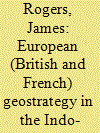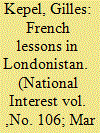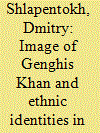|
|
|
Sort Order |
|
|
|
Items / Page
|
|
|
|
|
|
|
| Srl | Item |
| 1 |
ID:
121101


|
|
|
|
|
| Publication |
2013.
|
| Summary/Abstract |
The rise and integration of the Indian Ocean region and the Pacific rim over the past decade - into an 'Indo-Pacific' zone - and the emerging competition between the region's major powers, has drawn increasing attention. However, France and the United Kingdom, while long established in the Indo-Pacific, are often overlooked, even though they are both themselves starting to refocus on the region. Paris has consolidated a 'quadrilateral' of interlocking military stations, which runs down the western Indian Ocean, while London has boosted its 'strategic array', a collection of military facilities, logistical hubs and regional partners and allies, stretching from the Eastern Mediterranean to South-East Asia. Although fiscally under pressure, both countries seem determined to maintain their influence in the Indo-Pacific, but will nonetheless have their work cut out as emerging powers seek to boost their own respective positions in the region. Thus, the two European powers' ability to remain significant actors will depend on their willingness to coordinate with one another and other allies to focus their geopolitical awareness; create new partnerships with the rising Indo-Pacific countries; and provide the necessary resources to maintain - or better, bolster - their naval reach.
|
|
|
|
|
|
|
|
|
|
|
|
|
|
|
|
| 2 |
ID:
093708


|
|
|
|
|
| Publication |
2010.
|
| Summary/Abstract |
MUSLIMS HAVE been landing on the shores of Britain and France for decades. And, as these populations arrived and settled in the Republic, Paris pursued a policy it believed would eventually lead immigrants to full cultural integration into French society. Meanwhile, London, facing a similar influx of foreigners, attempted to create a full-fledged multicultural polity. The former emphasized that what was shared between the new arrivals and their native hosts was crucial, their differences secondary. The latter argued that the British needed to respect the uniqueness of their immigrant neighbors-whether national, religious or ethnic-and that such a stance was at the core of a harmonious political system. In color-blind France, built on a long tradition of a strong, centralized state and the successful assimilation of southern and eastern Europeans-who have been migrating to the country since the nineteenth century-religious identity was not to interfere in public life. Under the French tricolor, state and nation were fused into the cradle of the one and indivisible Republic. In race-aware Britain, with Anglicanism as its established church, there was always room for different nationalities-English, Welsh, Scottish, Irish-under the Union Jack.
|
|
|
|
|
|
|
|
|
|
|
|
|
|
|
|
| 3 |
ID:
092408


|
|
|
|
|
| Publication |
2009.
|
| Summary/Abstract |
The recent rise of Asia as a global geopolitical center has led to renewed interest in Asian history, not just by Asians but by Europeans as well. Genghis Khan is one of those figures who attracts attention, and several movies on him have recently been created. One of them was made in Russia and has led to broad public response. These responses have made it possible to gauge the views of the Russian public on the role of Russia in the global community and the relationship between Russians and ethnic minorities of the Russian Federation.
|
|
|
|
|
|
|
|
|
|
|
|
|
|
|
|
|
|
|
|
|